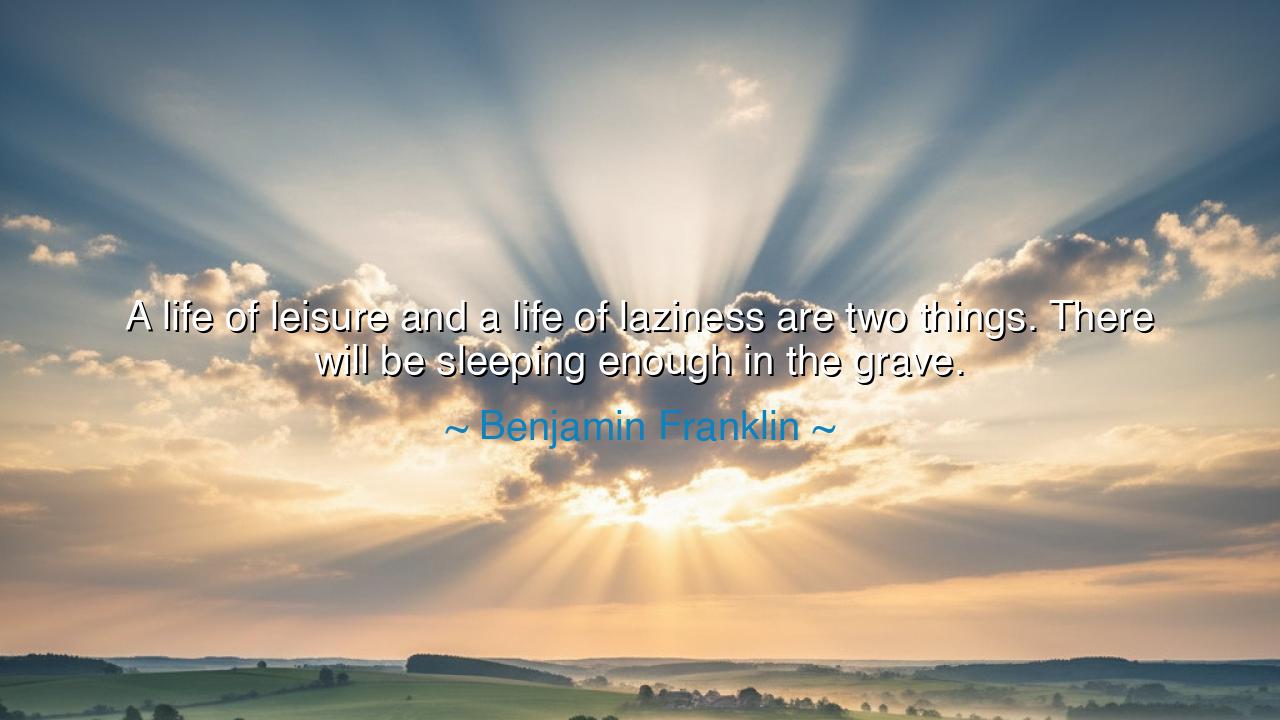
A life of leisure and a life of laziness are two things. There
A life of leisure and a life of laziness are two things. There will be sleeping enough in the grave.






Benjamin Franklin, the sage of Philadelphia, once declared: “A life of leisure and a life of laziness are two things. There will be sleeping enough in the grave.” These words, though born in the bustling streets of colonial America, resound like the admonitions of the ancients. Franklin speaks of the balance between rest and idleness, between the joy of leisure and the curse of sloth. He reminds us that while leisure is the reward of labor, laziness is its betrayal. Life is fleeting, and though rest has its place, our true inheritance is to use our days wisely, for the long sleep of death awaits all.
The origin of this saying is rooted in Franklin’s philosophy of industry and virtue. A printer, inventor, statesman, and philosopher, he built his life upon discipline and purpose. Yet he was no enemy of leisure; he delighted in conversation, music, books, and wit. But Franklin drew a line between leisure that refreshes and laziness that corrupts. For leisure is the friend of productivity, while laziness is its enemy. In warning us that “there will be sleeping enough in the grave,” he calls us to spend our waking hours in labor, learning, and service, knowing that death will grant us more than enough stillness.
The ancients knew this truth as well. The Stoics taught that life is short and should be spent in pursuit of virtue and wisdom, not wasted in idleness. Marcus Aurelius wrote in his Meditations that time is fleeting and each hour lost to sloth is a theft from the soul. In another land, Confucius urged diligence and purpose, warning that laziness brings shame to one’s family and dishonor to oneself. Franklin’s words echo these timeless teachings: to live well is to work with vigor, and to rest only that one may rise stronger.
History gives us examples that prove this wisdom. Consider Leonardo da Vinci, who filled his days with invention, painting, and endless curiosity. He knew the taste of leisure in music and friendship, but he never surrendered to laziness. His legacy endures because he understood that each hour was precious, and that true rest comes not from idleness, but from the satisfaction of a day well spent. Contrast him with rulers who drowned their days in indulgence, whose kingdoms crumbled as they slept in decadence. Their lives prove Franklin’s warning: sloth is a grave dug long before death arrives.
The lesson is luminous: distinguish between leisure and laziness. Leisure is sacred—it restores the mind, nourishes the spirit, strengthens bonds with others. Laziness, however, weakens the will, erodes the body, and steals from the future. Franklin calls us to embrace leisure as a servant of life, but to cast away laziness as a thief of purpose. For the grave will offer endless sleep, but only now can we labor, create, and love.
Practical actions follow. Rise each day with purpose. Work diligently in your calling, whether humble or grand. Allow yourself moments of leisure—walks beneath the sun, music in the evening, the laughter of friends—for these give strength to the soul. But do not surrender your days to sloth, for every wasted hour is a treasure buried and lost. Keep before your eyes the truth: rest enough awaits beyond death; now is the time for striving, learning, and service.
Thus, O listeners, let Franklin’s words guide you: “There will be sleeping enough in the grave.” Life is brief, but its possibilities are vast. Do not waste your days in idleness, nor confuse leisure with laziness. Let your life be a rhythm of labor and rest, work and joy, duty and delight. In this balance lies the path to greatness and peace.
And remember this eternal truth: the measure of a life is not in how long one sleeps, but in how fully one awakens to the tasks of the day. Work while you live, love while you breathe, and when the grave claims you, let it find you weary not from idleness, but from a life well lived. For leisure refreshes the soul, but laziness consumes it.






AAdministratorAdministrator
Welcome, honored guests. Please leave a comment, we will respond soon